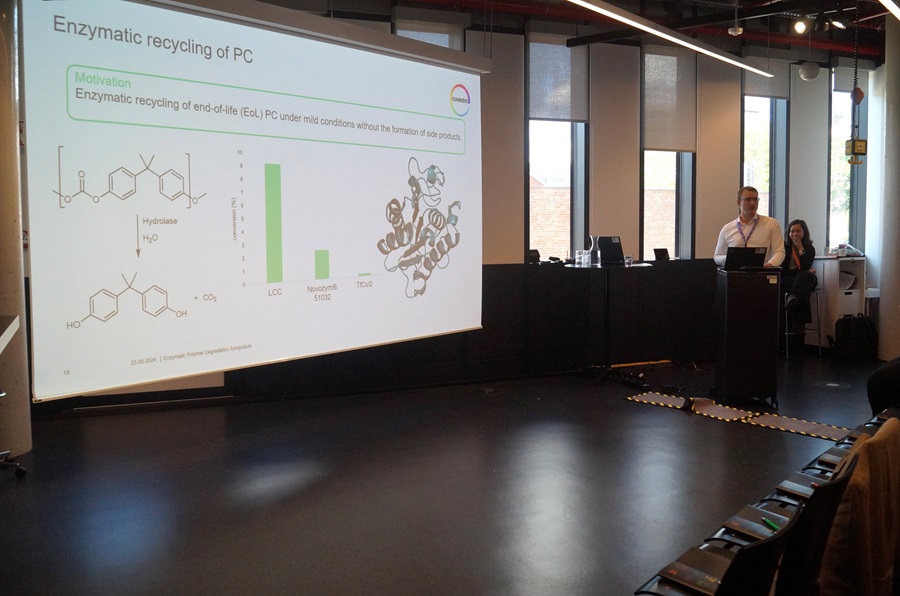International Symposium brings together Experts of Enzymatic Polymer Degradation

On May 23rd, the Covestro headquarters in Leverkusen hosted the symposium on "Enzymatic Polymer Degradation," organized by the NEnzy team. Renowned representatives from science and industry across Europe gathered to discuss the latest research in this field, exchange experiences, and expand their networks.
Enzymatic polymer degradation is gaining increasing importance, particularly in the context of plastic recycling, due to the global waste disposal crisis, rising CO2 emissions, and the finite nature of crude oil resources. Significant progress has already been made in both university research and industrial applications to replace linear production pathways with sustainable recycling methods.
Participants from research institutions and industrial companies across various European countries presented their latest findings in technical lectures. The topics ranged from the identification of new enzymes and targeted enzyme engineering to the establishment of an industrial process for the enzymatic recycling of PET.
The scientifically rich program was well received by all participants, as confirmed by Barbara Bleier, Senior Project Manager for Sustainability Technology at Covestro: "The symposium provided an excellent platform to summarize the current state of developments in the field of enzymatic polymer recycling and to promote scientific exchange. It is encouraging to see that such a large community is intensively engaged with this nature-inspired and inspiring technology, and that there are already initial industrial applications. While some recycling approaches are still being researched, others have already taken the step towards commercial scaling. Enzymatic recycling could represent a particularly promising option for sustainably returning plastic waste to the cycle due to its energy-efficient and potentially more environmentally friendly process.”
In addition to the technical lectures, several poster sessions provided space for lively discussions and new input on various projects. Luís Miguel Correia Teixeira, a doctoral student at the University of Porto, commended the diverse program: "It was a well-organized event that promoted the exchange of state-of-the-art knowledge regarding enzymatic depolymerization. In addition to the expert talks, the poster sessions offered a space to observe and debate ongoing research efforts."
Beyond the scientific content, the symposium was also a success for the cross-site collaboration of the NEnzy team. This was highlighted by Prof. Ulrich Schwaneberg, Head of the Institute of Biotechnology at RWTH Aachen University and member of the Scientific Board at the DWI Leibniz Institute for Interactive Materials, who also supports the junior research group as a mentor: "The NEnzy Symposium offered exciting insights into scientific and industrial research across Europe for a sustainable polymer circular economy and demonstrated that the model of a bridging research group hosted by Covestro in cooperation with RWTH Aachen University is a successful example of close industrial and academic collaboration."
At the end of the official part of the symposium, participants visited the Idea Lab at the Covestro headquarters. Numerous exhibits, from finished products to recycling process intermediates, illustrate Covestro's successes in establishing a circular economy.
The day concluded with a joint dinner and informal gathering, where scientific exchanges continued alongside shared stories of recent vacation adventures.







